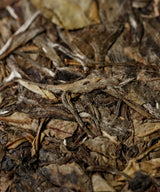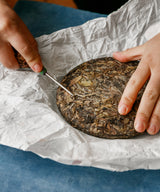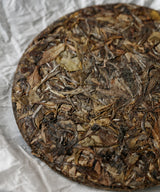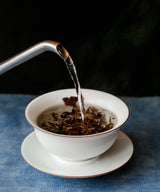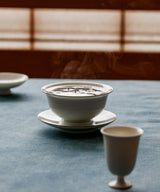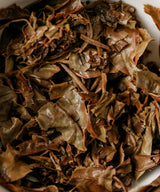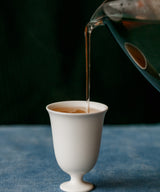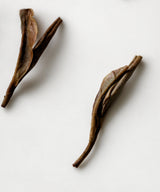White Shuixian
老枞水仙白茶
Harvest
April 2022
Origin
Yongchun, Fujian
When appreciating tea from the Southern Fujian Province there is a small, lesser known region, bordering Anxi in the South and Dehua in the North, called Yongchun that we must pause our attention on. Before the 1950’s the population of Yonghcun had significantly dwindled: many of its native inhabitants had emigrated to Southeast Asia. In the 50’s, when the politics shifted to allow many of them to move back and resettle in their home village, they planted tea trees and established tea farms. These returning villagers favoured the Buddha’s Hand varietal brought from Anxi, and the Shuixian varietal brought from Jianyang. As a result, Yongchun has a surprising number of old grove tea trees that are now more than 60 years old.
Our friend Mei’s encounter with Yongchun oolong started in the summer of 2013, when she was visiting her university teacher in Anxi. In her teacher’s tea room she saw a tea labeled “1960’s Yongchun Buddha’s Hand.” Having never seen a tea like this before, she was very excited, but also felt slightly embarrassed by her ignorance of something that was once so treasured. Mei roughly understood that Yongchun Buddha’s Hand was a well known tea amongst older people in the region, but younger generations did not really know why. Mei was very touched by this brief encounter she had with Buddha’s Hand, and this motivated her to deepen her understanding of its traditional value.
For the last decade Mei has trekked almost all of the mountains and peaks of Yongchun. She has come across abandoned tea trees deep in the mountains, and remote small scale tea farms that are still in operation. With amazement, she discovered that there are many abandoned Buddha’s Hand and Shuixian tea trees tucked high up in the mountain forests. Most of these groves are at least 2000 ft in elevation. Many of the tea trees are around 30 years old, but Mei has found some that are closer to 100: they have been hidden deep in the mountains, forgotten, and thus also protected.
The tea trees that gave us this Shuixian grow in the Water Reservior Reserve Area, a dense, protected forest located at 2000 ft elevation. The trees were planted in the 1970’s, and have been growing untended in the mountains for the past 15 years.
This White Shuixian is an experimental tea. It is highly unusual to see Shuixian leaves crafted into anything aside from an oolong. In this instance, they have been made as a traditional white tea. White tea processing is so minimal and gentle, it is as though we taste Shuixian naked – without the characteristics imparted by roasting that come with crafting it as an oolong.
The first thing we notice when drinking this tea is the uncommon mouthfeel: it is oily and grassy from the oolong, yet maintains the refreshing sweetness and even temper of a white tea. The weight of the liquor is persistent, and it carries a heady floral quality with it, more akin to oolongs than the delicate florality we find with white teas. It has a striking vanilla flavour on the finish that, combined with the sun dried sweetness, approaches tasting like birthday cake. This strange and valuable encounter with an undressed Shuixian is a kind of celebration.
. . .
Brewing guide
| Tea | 4g |
| Temperature |
100 °C |
| Water | 120ml |
| Steep time | 10 - 60 sec |
| No. of infusions | 10+ |

